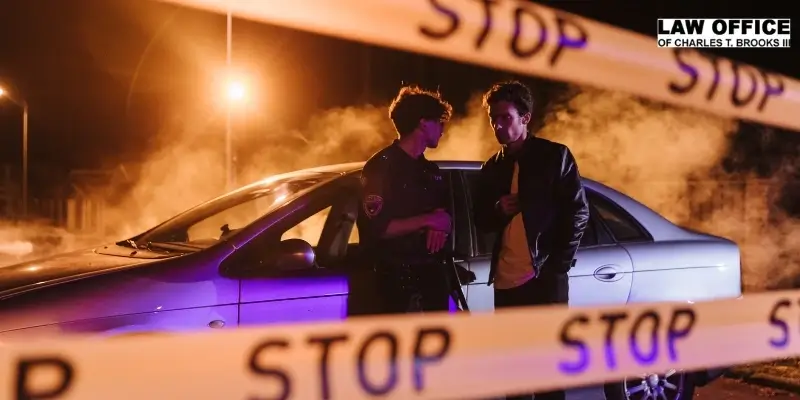|
|
Last Modified on Jan 05, 2026
Authorities treat common types of violent crime cases in South Carolina very seriously. These charges typically lead to substantial prison terms and enduring criminal records for the accused. Any criminal act that results in physical damage or incorporates force, threats, and weapon usage is rigorously prosecuted, which can leave lifelong consequences for the offender.
State law enforcement agencies in major cities such as Columbia, Charleston, and Greenville sustain their focus on decreasing violent crime through rigorous enforcement and swift prosecution as of 2026. By familiarizing themselves with frequent violent crimes, such as assault, robbery, and domestic violence, people can better understand how serious these charges are and why it’s essential to know their legal rights during accusations or investigations.
Assault and Battery
South Carolina frequently charges assault and battery as violent crimes, using a tiered classification system to determine their severity. Third-degree assault is a misdemeanor since it usually results in minor physical harm or none at all.
The state applies second-degree and first-degree assault charges when the alleged offense demonstrates increased severity or involves aggravating circumstances, such as weapon use or intentions to commit additional felonies. There were 62,891 simple assault crimes reported in 2023, equaling 117.04 per 10,000 South Carolina inhabitants.
A person convicted of assault and battery of a high and aggravated nature (ABHAN) faces felony charges, which can result in imprisonment for up to 20 years. Different levels of assault result in various consequences, while the specific charge depends on how much harm occurred, the level of force used, and the perpetrator’s intent.
Domestic Violence
Charges for domestic violence arise when someone physically harms or threatens a household member, such as a spouse, child, or relative. If a weapon is used or a restraining order is violated, the charge becomes more serious and can result in felony-level consequences. These cases are often emotionally charged and involve conflicting narratives, making it essential to understand the legal distinctions involved.
According to South Carolina’s 2023 family violence data, aggravated assault cases involving family members showed that 26.7% of victims were children, 26.4% were other family members, 18.9% were siblings, and 18.3% were parents.
Armed Robbery
In South Carolina, armed robbery ranks among the most violent crimes. It involves stealing from individuals through force or intimidation through the display of a weapon. The distinguishing factor between armed robbery and standard robbery lies in the fear element, which traumatizes victims simply through the implied threat, despite no actual injuries occurring.
The legal system imposes strict penalties for this crime, which include mandatory minimum sentences. The law also prohibits any eligibility for parole. Many cases in Columbia and similar urban locations result from convenience store incidents, street confrontations, or coordinated group actions. Prosecutors build strong cases against defendants by using security footage, eyewitness testimony, and forensic evidence.
Homicide and Attempted Murder
South Carolina recognizes murder, voluntary manslaughter, and attempted murder as homicide-related charges, with each depending on the specific circumstances and the suspect’s intent. A murder charge results from planned or intentional killing, which may lead to life imprisonment or the death penalty.
Manslaughter arises from impulsive actions taken during heightened emotional states, without any intention to kill. A person commits attempted murder by making active attempts to end a life, which ultimately fail.
Law enforcement agencies give high priority to these cases because they require extensive forensic analysis, digital records investigation, and multiple law enforcement interviews. The applicable charge depends on the defendant’s motives and timing, along with their previous actions or threats.
FAQs
What Qualifies as a Violent Crime in South Carolina?
In South Carolina, violent crimes comprise offenses that involve physical force or threats of harm and result in serious bodily injury. Typical violent crimes include assault, robbery, homicide, domestic violence, and criminal sexual conduct.
Certain property crimes become violent offenses when they involve specific situations, like burglary with a weapon. Stricter penalties for these offenses can affect parole eligibility and sentencing guidelines while reclassifying future charges.
What’s the Difference Between Burglary and Breaking and Entering?
Burglary is the act of entering a structure without permission and with the purpose of committing an unlawful act, such as theft. Breaking and entering does not necessarily involve the intention to commit additional crimes, and this term usually means gaining access through force.
South Carolina categorizes burglary as a felony, which includes several degrees, depending on the specific circumstances involved. A person’s intent to commit a crime differentiates burglary from less severe offenses, such as trespassing or unauthorized entry.
Can a First-Time Offender Go to Prison for a Violent Crime?
Yes, a first-time offender can go to prison for a violent crime. The court determines sentencing based on the nature of the charge, the presence of any aggravating factors, and mandatory minimum sentences. Alternative sentencing and diversion programs exist for first-time offenders, but eligibility varies. Judges place greater weight on the offense’s severity than on the defendant’s prior record when deciding on sentences for serious crimes, such as armed robbery or domestic violence.
How Is Assault Different From Battery in South Carolina?
Assault describes threats or attempts to inflict physical harm, while battery involves direct physical contact. South Carolina often merges assault and battery into single charges that are graded by the level of injury and weapon involvement. A person convicted of assault and battery of a high and aggravated nature (ABHAN) in South Carolina faces a felony charge.
Contact the Law Office of Charles T. Brooks III for South Carolina Violent Crime Defense
People accused of violent crimes in South Carolina face significant legal repercussions and personal impacts. Knowing about different charges and their prosecution methods enables you to make better decisions if you are ever accused or investigated. Every legal case, from assault to homicide, demands meticulous legal guidance.
The Law Office of Charles T. Brooks III provides legal assistance to those who face violent crime charges. Contact us immediately to review your legal situation and make sure your rights are defended going forward.




